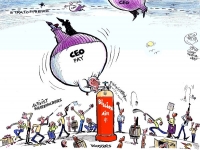Do Not Pay Dozen: 12 CEOs Who Met Shareholder Spring Revolts

Martin Sorrell, CEO of WPP, the global ad agency, was defeated Wednesday in his attempt to get shareholders to approve his $20 million (£13 million) a year salary. He was at least the 12th CEO to face a shareholder revolt against excessive compensation this spring.
"Ever since the first revolts erupted in earnest this year, the "shareholder spring" has been searching for its own Hosni Mubarak to rally against," writes Jonathon Ford in the Financial Times. "Now a suitably pharaonic candidate has emerged in Sir Martin Sorrell."
WPP began life as Wire and Plastic Products plc in 1971, as a company that manufactured wire shopping baskets, but was bought out in 1985 by Martin Sorrell, former finance director of Saatchi & Saatchi. Today it is one of the most powerful ad agencies in the world, after having bought up some of its most famous rivals like Burson-Marsteller, Grey, Hill & Knowlton, JWT, Ogilvy Group and Young & Rubicam. Sales in 2011 hit £10 billion ($16 billion)
Sorrell defended his salary in a June 5 Financial Times commentary titled "I Act Like The Owner That I Am." "I find the controversy over my compensation
deeply disturbing. Some imagine that I wake up every morning and make
decisions, including those over compensation, in the shaving mirror ... If the government or institutions believe pay is excessive, tax it. Do
not fiddle with the market mechanism. WPP is not a failure, it is a
success."
A week later, some 60 percent of shareholders voted against Sorrell's pay package. The revolt "appeared to stun the board directors as they watched the results appear on TV screens" wrote the Independent. (The directors were meeting on Wednesday in Dublin, where the company is headquartered to avoid taxes)
"People are concerned because there is a recession, they're concerned about inequality, inequality of wealth and incomes," a suitably chastened Sorrell told a Reuters meeting in Paris on Thursday. "At times of recession people become more concerned about that, you see that politically."
Here is the CorpWatch list of CEOs who have seen significant shareholder votes against their multimillion dollar salaries so far this spring.
* David Brennan, CEO of AstraZeneca, the Anglo-Swedish pharmaceutical company, resigned April 26 after shareholders voted against his £9 million pay ($14.4 million)
* Andrew Moss, CEO of Aviva, the top UK insurance company, was forced to resign on May 8 after he lost a vote against his £2.7 million ($4.3 million) pay package
* Sly Bailey, CEO of Trinity Mirror, the UK's biggest newspaper group, decided to step down May 3 after shareholders voted against her £1.7 million ($2.7 million) pay
* Vikram Pandit, Citibank's CEO, faced a revolt against his proposed salary of $15 million from some 55 percent of shareholders
* Brady Dougan, CEO of Credit Suisse, saw his salary slashed in half to $6.37 million
* Bill Gammell, founder of Cairn Energy, lost share options worth £2.5 million ($4 million) after 67 percent of shareholders voted against his pay package
* Mike Davies, chairman of Pendragon, a UK car dealership, saw 25 percent vote against his salary
* Andrew Sukawaty, the executive chairman of Inmarsat, the satellite phone company, saw a shareholder revolt against his £2.66 million salary ($4.25 million)
* Ralph Topping, CEO of William Hill, a major UK betting company, saw 49.9 percent of shareholders vote against his £1.2 million ($1.92 million) pay package
* Ivan Glasenberg, CEO of Swiss mining company Xstrata
* Kaspar Villiger, chairman of UBS bank in Zurich



